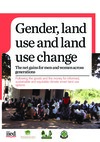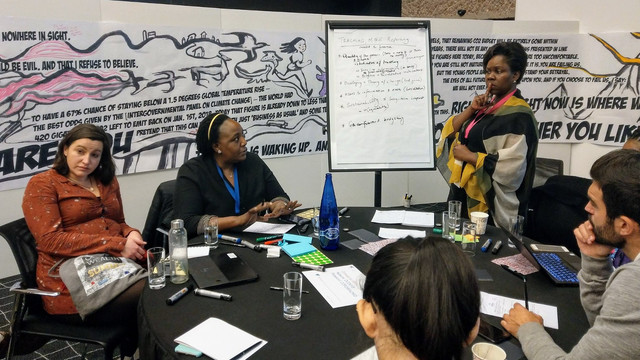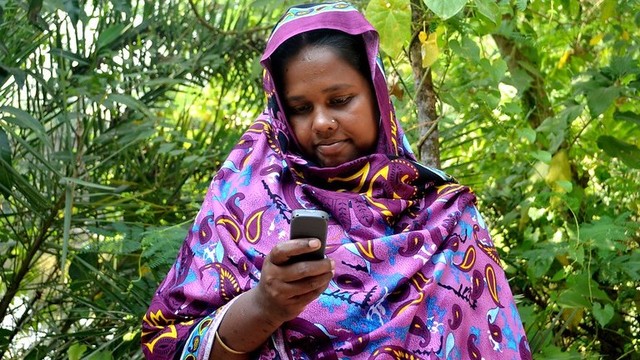Gender and REDD+
Women from poor, forest-dependent communities play a key role in the management of forests, and yet they are frequently marginalised from decision-making in communities. This is a problem as gender equity is essential for tackling more sustainable forest management, and to achieving the aims of REDD+, which aims to reduce emissions and conserve forests in specific countries.

REDD+ aims to compensate countries that reduce emissions from land use and land use change, as well as conserving, sustainably managing or enhancing forests, as a means of mitigating climate change.
Women play a key role in managing forests but are often left on the sidelines of international and national policymaking. The same is true when it comes to sharing the benefits of climate investment finance.
What did IIED do?
REDD+ readiness plans should not only avoid harming women and other marginalised groups, but actively seek to address their needs and harness their strengths. Read this briefing for more information.
IIED worked with partners in Mozambique, Nepal, Tanzania and Vietnam to conduct research on the participation of women in REDD+ processes at national and local level.
This research focused on three aspects of gender analysis:
- Rights – to land, forests and the carbon held within standing forests
- Power – to participate in decision making, and
- Equity – an equitable share in the profits from forest-related products.
All countries selected for this study were already implementing participatory natural resource management and other inclusive rural development approaches. We believed that working with existing institutions involved in the planning of national-level REDD+ processes would enable us to assess inclusiveness and good governance, which is equitable, accountable and transparent.
One factor in the success of REDD+ is the extent to which individual land users – including women – feel incentivised to change behaviour and practices.
All countries selected for this study have been implementing participatory natural resource management and other inclusive rural development approaches. We believe in working with existing institutions involved in the planning of national-level REDD+ processes to assess inclusiveness and good governance, which is equitable, accountable and transparent.
It is clear that the success of REDD+ depends on the extent to which individual land users — including women — feel incentivised to change behaviour and practices.
Findings
In Tanzania, charcoal and simsim were the major drivers of forest degradation and deforestation in the study areas. All actors in the value chain benefited from the land uses, however men dominated in simsim value chain and women in charcoal.
Recommendations included the sustainable intensification of simsim production because it is a profitable commercial crop and improving simsim yield per unit area would contribute towards decreasing clearing of forests. Also, formalisation of charcoal business would improve benefit sharing, equity and act as an incentive for local communities to participate in conservation, such as patrolling, reporting illegal harvesting and preventing bushfires.
In Vietnam, around 2.6 million people benefited from a highly competitive coffee industry in the central Highlands, thus market liberalisation and government ambitions to position Vietnam in the global arena motivated massive conversion of rich natural forests into coffee plantations. Without land use policies and strict enforcement, the remaining natural forest was an easy target for investment speculators.
Meanwhile, women’s roles had shifted to being more involved in the middle and upper part of the market value chain, and women’s roles in household decisions suggested ‘gender equality’; however, women’s dissatisfaction remain in terms of the incomes earned, suggesting the need to consider safeguards or strategies that address their specific needs.
Recommendations for the REDD+ programme included ensuring national and sub-national REDD+ action plans conduct trade-off analysis on forest conversion to commodities, study the process and benefits of land sharing approaches, and conduct valuation studies of forest environmental services to support REDD+ negotiation.
Additional resources
His REDD+, her REDD+: how integrating gender can improve readiness, Isilda Nhantumbo, Linley Chiwona- Karltun (2012), IIED Briefing Paper
Mainstreaming gender and climate change in Nepal, Jony Mainaly, Su Fei Tan (2012), IIED
Partners
Mozambique: Eduardo Mondlane University
Tanzania: Sokoine University of Agriculture
Nepal and Vietnam: UN-REDD Regional Office in Asia




